Release the Face
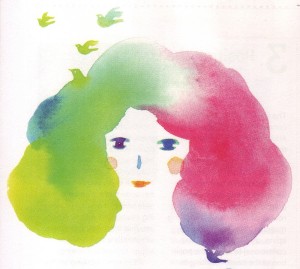 The June issue of Mindful magazine offers excellent practice instructions, including these steps to help release tensions that many of us unconsciously carry in our face:
The June issue of Mindful magazine offers excellent practice instructions, including these steps to help release tensions that many of us unconsciously carry in our face:
1. Let the flesh of the cheeks hang (you can lightly visualize weight pulling them down and releasing them.)
2. Allow the forehead to soften (you can lightly visualize the sense of tension draining.)
3. Feel how fine the sensations are in the lips and the tongue (the mouth is the site of some of the most delicate sensations in the body and for this reason has been featured prominently in meditation instructions across many traditions.)
4. After playing with these releases for a while, you will notice that they become second nature. Therefore, over time, shifts in attention become coupled with a softening response that has a powerful effect on the entire system. A good reference point for these adjustments is the face of a baby. When you study the face physiology of babies and other mammals, the complete lack of excess tension, the “receptivity” in the facial tissues, and the general sense of equanimity are striking.
(illustration by Nomoco)
Venerate and Serve.
 In yesterday’s post, I wrote that 2 phrases seem to have “come home with me” from the retreat with Ajahn Sucitto. One of the phrases is: Simplify and Enjoy, which I wrote about yesterday. The other is Venerate and Serve.
In yesterday’s post, I wrote that 2 phrases seem to have “come home with me” from the retreat with Ajahn Sucitto. One of the phrases is: Simplify and Enjoy, which I wrote about yesterday. The other is Venerate and Serve.
In the talk on the first morning of the retreat, Ajahn Sucitto said, “The Buddha himself, that great being, after his awakening and deciding to teach…one of his further recollections was: ‘One lives miserably if one has no one to serve. No one to venerate. But I have no teacher. Who can I venerate? Who can I serve? I see no one who has given me these qualities. And yet… So I shall revere and venerate the Dhamma.’” (You can listen to the full talk here.)
One lives miserably if one has no one to serve. No one to venerate. I heard those words…and I’m not even sure what “serve” and “venerate” would mean for me, in my life, but something in me was stirred. Something in me sat up, took notice, and said Yes! That’s right! But it’s not about serving some one — some teacher or guru or god of some kind — it’s not even about service to a philosophy or ideology or religion or anything like that. For me, it’s about something much bigger. Some primal truth that’s deeper than that.
Sucitto said, “Within the intimacy of one’s own karmic flow, there is the possibility to live beautifully. Graciously. Modestly. Without demand and without resistance. Without a kind of slumping, and without forcing. This is the servant of the Dhamma.”
Yes.
***
(image from: Offerings, by Danielle and Olivier Follmi)
Simplify and Enjoy.
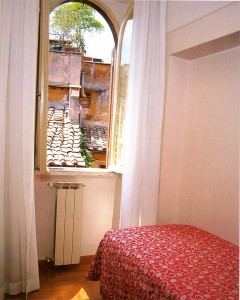 There are 2 phrases that have “come home with me” from the retreat with Ajahn Sucitto. I say it that way because it definitely feels like these phrases have somehow actively connected with me — taken up residence in my mind/heart/body — in some way that feels….deeply lasting…indelible. Like a psychic tattoo! But deeper and more transformative than that.
There are 2 phrases that have “come home with me” from the retreat with Ajahn Sucitto. I say it that way because it definitely feels like these phrases have somehow actively connected with me — taken up residence in my mind/heart/body — in some way that feels….deeply lasting…indelible. Like a psychic tattoo! But deeper and more transformative than that.
One of the phrases is: Simplify and Enjoy. (The other is: Venerate and Serve, but that’s for another post.)
Sucitto was talking about samadhi practice (concentration, unification of mind) when the phrase Simplify and Enjoy first “stepped through the door.”
“Samadhi is really about simplicity. Simplifying. Cut to the chase. Trim off the discursiveness — the “ifs” and “ands” and “buts” and “maybes” — get to the point; stay with it; get focused. And enjoy. Samadhi is simplification that enables us to more fully enjoy and deepen into what we’re experiencing.”
And there was a certain “ah-ha” quality in hearing that as a way to approach and understand practice. But it was more than that, too. I somehow got, in a very profound way, that the intention to Simplify and Enjoy…..is the way I want to live my life.
***
(image from Cheap Hotels, by Daisann McLane)
A Particular Kind of Beauty
 As I posted on Friday, Ajahn Sucitto spent quite a lot of time at the retreat talking about beauty. This is not a word I’d often heard on retreat. “Wholesome” — yes. “Noble”, “Beneficial”, “Good” — yes. But “Beautiful” — not so much.
As I posted on Friday, Ajahn Sucitto spent quite a lot of time at the retreat talking about beauty. This is not a word I’d often heard on retreat. “Wholesome” — yes. “Noble”, “Beneficial”, “Good” — yes. But “Beautiful” — not so much.
He said: The practice of the path is beauty. “Beauty” meaning admirable, lovely, uplifting. It’s a particular kind of beauty that’s encouraged. Beauty of intention. Beauty of heart. (You can listen to the entire talk here.)
He started the talk in reference to the morning rituals of chanting and lighting candles. “Awakening the wise like the sun awakening the lotus.”
He quoted the suttas, which say that the Buddha’s teachings are: “Beautiful in the beginning, beautiful in the middle, beautiful in the end.” Then he went on to say: For the faith mind, this is exactly right. Incline toward beauty. Flowers, candles, incense. You don’t need these, specifically, but you do need beauty. And offering. Because this what beauty is. Spiritual beauty is just this–the beauty of offering…..
In in the morning, when you’re not feeling very beautiful at all, just: OK. Let’s get up. Breath it in. Move it around. Freshen it up. Sit down, make an offering. Open to that.
In monasteries, that’s the day. That’s the beginning. It’s not a rule, not on the level of rules. But it’s certainly on a level of loyalty. Where’s one’s faith, if you’re not doing that? What are you here for?
So you rise up….
Our life is continually passing. Could that be beautiful, rather than the fumbling of uncertainties and disappointments… Letting things end beautifully. And the awareness of that–the awareness of being with the beginning of things….persisting in the middle…letting it change, letting it slip away, letting it move on. The kind of intentions that support that — these are truly magnanimous, free from blemish, free from grasping.
Beautiful.
Enjoyment. Pleasure. Simplicity. Beauty.
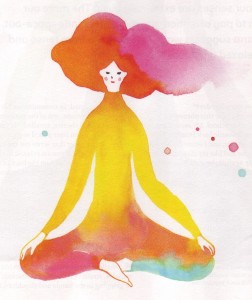 Enjoyment was a big theme of the retreat led by Ajahn Sucitto. (Which may be a surprise to many who think that all we Buddhists ever talk about is suffering.) Enjoyment. Pleasure. Simplicity. Beauty. These are words he used over and over again, in all his talks, during the entire 8 days of the retreat.
Enjoyment was a big theme of the retreat led by Ajahn Sucitto. (Which may be a surprise to many who think that all we Buddhists ever talk about is suffering.) Enjoyment. Pleasure. Simplicity. Beauty. These are words he used over and over again, in all his talks, during the entire 8 days of the retreat.
Here are just a few examples, all from the talk he gave on the first full night (which you can listen to by clicking here):
The first thing is to acknowledge: “I have aspiration.” Then ask what is that aspiration triggered by….what really resonates for me. If it resonates for you, you’ll have energy for it. When you apply energy to something that you find resonant, you’re bound to get results. That gives you increased confidence. And enjoyment.
Enjoyment is the sign of proper energy. It doesn’t mean it’s always easy. You get a feeling that this may be work–but you’re enjoying it. That’s the mark. If it isn’t there, then you’re not going to keep going…..
Breathing is very helpful for that because breathing has an energy in it, a natural body energy, and so as you apply yourself to that, you begin to get the feedback of that, a subtle vitality, a clarity — that’s enjoyable….
What one begins to see is that radical simplicity from the manifold events of our lives…..when you can get it down to just the one point, for example: “This is ill will,” or “This is passion,” or “This is longing,”….then you see it for what it is. You see the danger of adding to it. You handle it carefully. You handle it wisely. You never lose respect for yourself with that. “This is beneath me.” “I don’t need to do this.” “This is belittling.” “This disfigures me.” Then you dispel it….. Faith in oneself is required. Confidence in oneself….. You are not the hindrance. You mustn’t confuse the disease with the patient. You have to remember that you are the Beautiful, and this is not worthy of you. Then just put it aside. You can do that….
You’ve got to simplify….. If it’s not necessary, not helpful, not appropriate — don’t bother. There’s not so much time. We could go any day! Don’t bother wasting your time and energy in stuff that is not resonant, not purposeful, not furthering. There is something good for us if we stay on track…. “Could this be simpler?” Just keep the question there. It could be more complex, that’s easy. But could it be simpler? Try bearing that question in mind. That’s the kind of fundamental inquiry/question that gives rise to samadhi [concentration]…
For example with the breathing… Is it bright? Is it clear? Is it strong?…. Gradually the breathing becomes simplified to a single sign. The sign of something clear, bright, encouraging for the mind to gather around. You need to learn the skill of simplicity.
If that simplicity is cultivated with mindfulness and appropriate attention, you see the results of the mind beginning to unify. And as it unifies…..the mind seems to have a particular body to it. And the feeling, the particular feeling is a pleasant feeling, a bright pleasant feeling…. And this is called the world-stopper, because the world — what is called the world — really means the diversification, where the mind’s energy is scattered over many, many things. In unifying, all that energy comes back and it starts to unify to something you can really enjoy and stay with…..
From the point of view of the world, this sounds like annihilation, but from the point of view of experience, it’s release. Freedom. Peace…. That’s where it goes. That’s what happens. And the path is marked by happiness and joy.
***
Want more? Listen to the talk. Click here. And enjoy.
(image from Mindful magazine, June 2014)
Dharma Town Salad Dressing
 I really love the food at Spirit Rock and IMS, and even though I’m back from retreat, I’m still trying to eat like I’m there. At IMS, for example, I make a salad every day — with whatever greens are available plus lots of chickpeas, shredded carrots, raisins, walnuts, sunflower and pumpkin seeds — and when available, the IMS made-from-scratch honey-mustard salad dressing. I don’t have their recipe, so I came up with my own:
I really love the food at Spirit Rock and IMS, and even though I’m back from retreat, I’m still trying to eat like I’m there. At IMS, for example, I make a salad every day — with whatever greens are available plus lots of chickpeas, shredded carrots, raisins, walnuts, sunflower and pumpkin seeds — and when available, the IMS made-from-scratch honey-mustard salad dressing. I don’t have their recipe, so I came up with my own:
Sweet-and-Sassy Honey-Mustard Dressing
5 Tablespoons honey
4 Tablespoons extra virgin olive oil
3 Tablespoons Dijon mustard
3 Tablespoons white balsamic vinegar
Pinch of Kosher salt
Combine all the ingredients in a jar and shake, shake, SHAKE!
Get Rich Quick
 On the first morning of the retreat I sat led by Ajahn Sucitto, after the chanting and candle-lighting ceremony (puja) we participated in, he gave a wonderful talk about the meaning — the intention — of these morning rituals. (You can listen to both the chant and the talk that follows here.)
On the first morning of the retreat I sat led by Ajahn Sucitto, after the chanting and candle-lighting ceremony (puja) we participated in, he gave a wonderful talk about the meaning — the intention — of these morning rituals. (You can listen to both the chant and the talk that follows here.)
I loved what he said about the happiness and pleasure that can come from lifting up our minds when we make offerings in this way:
In meditation we are learning to find pleasure not so much in the contact we have with objects, but in the quality of attention we bring…the ability to rise up, lift up the mind, with intention….We find pleasure not in contact with an object, but in the mind’s action toward the object…..
Lifting the mind up has a pleasant feeling to it…
There are different kinds of lifting up…but the most common and accessible kind comes from service and generosity….
The pleasure of happiness we can get from having things is one kind of pleasure. But the pleasure we can get from giving, serving, offering makes us feel innately rich. We feel wealthy, endowed, empowered, dignified, filled with self-respect.
The Buddha’s teachings are very pragmatic. It’s not just trying to tell us to be good. It’s actually saying: This is really how you get happy….in a particular way that’s calming and steadying, not just exciting.
***
(image from Q-Cards by zolo.com)
Note to Self
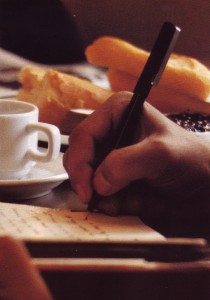 It’s not generally recommended to take notes on a retreat. This is because real, lasting wisdom is experiential — not conceptual — and that whatever words we use to describe what we have come to know can only be an approximation…a translation….of the actual experience of understanding something. That said, I often jot down (after the retreat) a phrase or two that really seemed to speak to me.
It’s not generally recommended to take notes on a retreat. This is because real, lasting wisdom is experiential — not conceptual — and that whatever words we use to describe what we have come to know can only be an approximation…a translation….of the actual experience of understanding something. That said, I often jot down (after the retreat) a phrase or two that really seemed to speak to me.
In the case of the Rebecca Bradshaw retreat, I wrote down a quote she used in one of her dharma talks, actually a variation on a quote by Anthony de Mello:
The Secret to Serenity is Wholehearted, Unrestricted Cooperation with the Unavoidable.
Worth taking note.
After the Retreat
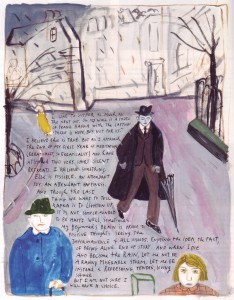 I’m back from the weekend retreat here in St. Louis with Rebecca Bradshaw, which was great. So I take this occasion to post another illustration by Maira Kalman, titled After the Retreat, in which she writes:
I’m back from the weekend retreat here in St. Louis with Rebecca Bradshaw, which was great. So I take this occasion to post another illustration by Maira Kalman, titled After the Retreat, in which she writes:
I like to suffer as much as the next guy. On my wall is a photo of Franz Kafka with the caption: “There is hope, but not for us.” I believe this is true.
But as I approach the end of my first year of meditation (erratically, so erratically) and have attended two very short silent retreats, I believe something else is possible. An attendant joy. An attendant happiness. And though the last thing we want to tell Kafka is to lighten up, it is not simpleminded to be happy.
Well, sometimes. My beginner’s brain is prone to positive thoughts. Seeing the impermanence of all moods. Enjoying the idea, the fact, of being alive. End of story.
And when I die and become the rain, let me not be a raging miserable storm. Let me be instead a refreshing, tender, loving shower. But I am not sure I will have a choice.
(image from Mindful magazine, Feb 2014. click to enlarge)
Off I Go Again
 Rebecca Bradshaw is in town today to lead a weekend retreat, which starts this evening, so I’ll be sitting and walking tomorrow, but not posting.
Rebecca Bradshaw is in town today to lead a weekend retreat, which starts this evening, so I’ll be sitting and walking tomorrow, but not posting.
A friend wrote to me the other day and said that I must be “very Zen” after all these retreats. By which I’m pretty sure she meant that I must be very relaxed, calm and peaceful (hopefully not very odd and frustratingly inscrutable!).
The truth is that I do feel more relaxed, calm and peaceful….at least some of the time. But even more than that, I think the result of all these retreats is that I’m more able to act from conscious intention….instead of automatically reacting based on old wounds or force of habit….and as a result of that, I’m kinder, more patient, less caught up in the daily drama of things when they’re not going the way that I want them to.
Which means that basically….I’m happier! (Not a bad reason to go on retreat.)
